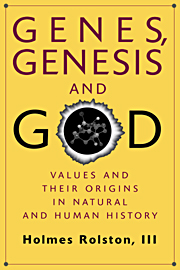Book contents
- Frontmatter
- Contents
- Preface
- Chapter 1 Genetic Values: Diversity and Complexity in Natural History
- Chapter 2 Genetic Identity: Conserved and Integrated Values
- Chapter 3 Culture: Genes and the Genesis of Human Culture
- Chapter 4 Science: Naturalized, Socialized, Evaluated
- Chapter 5 Ethics: Naturalized, Socialized, Evaluated
- Chapter 6 Religion: Naturalized, Socialized, Evaluated
- References
- Index
Chapter 3 - Culture: Genes and the Genesis of Human Culture
Published online by Cambridge University Press: 05 June 2012
- Frontmatter
- Contents
- Preface
- Chapter 1 Genetic Values: Diversity and Complexity in Natural History
- Chapter 2 Genetic Identity: Conserved and Integrated Values
- Chapter 3 Culture: Genes and the Genesis of Human Culture
- Chapter 4 Science: Naturalized, Socialized, Evaluated
- Chapter 5 Ethics: Naturalized, Socialized, Evaluated
- Chapter 6 Religion: Naturalized, Socialized, Evaluated
- References
- Index
Summary
Animals do not form cultures, not, at least, cumulative transmissible cultures. Culture, in Clifford Geertz's memorable definition, “denotes an historically transmitted pattern of meanings embodied in symbols, a system of inherited conceptions expressed in symbolic forms, by means of which men communicate, perpetuate, and develop their knowledge about and attitudes toward life” (1973, p. 89). Culture, according to Edward B. Tylor, is “that complex whole which includes knowledge, belief, art, morals, law, custom, and any other capabilities and habits acquired by man as a member of society” (1903, p. 1). Robert Boyd and Peter J. Richerson write, “Culture is information capable of affecting individuals' phenotypes which they acquire from other conspecifics by teaching or imitation” (1985, p. 33). Culture, Margaret Mead often said, is “the systematic body of learned behavior which is transmitted from parents to children” (1989, p. xi). Unlike coyotes or bats, humans come into the world by nature rather unfinished and become what they become by culture.
NATURE AND CULTURE
Culture is a contrast class to nature, at least to physical and chemical nature, and, especially of interest here, to biological nature. Information in wild nature travels intergenerationally largely on genes; information in culture travels neurally as persons are educated into transmissible cultures. The determinants of animal and plant behavior are never anthropological, political, economic, technological, scientific, philosophical, ethical, or religious. The intellectual and social heritage of past generations, lived out in the present, re-formed and transmitted to the next generation, is regularly decisive in culture.
- Type
- Chapter
- Information
- Genes, Genesis, and GodValues and their Origins in Natural and Human History, pp. 108 - 159Publisher: Cambridge University PressPrint publication year: 1999



